What Dark Clouds Hide Read online
Page 6
He looked ten years older than his age. Nevertheless he reminded her more of the young lad from high school than he had done in a long time. His back was stooped, and his shoulders slanted down to two over-long arms hanging slackly at his sides. Despite the low temperature, rings of perspiration were outlined under his armpits.
‘We really need to make a start,’ Joachim said. ‘I don’t want to keep going all night long.’
Jon’s young colleague seemed just as fresh and well groomed as when he had arrived the previous day. His jeans were the same, Johanne thought, but now he was wearing a newly ironed, immaculate white cotton shirt. The only aspect to spoil the perfect image of a young man in his late twenties was the white socks he wore with his brown leather moccasins. He leaned against the fireplace, as he had yesterday, and fiddled with a hefty bunch of keys.
‘No later than midnight,’ he insisted.
It was inexplicable that Jon found it necessary to work right now, just over twenty-four hours after his only child had died, late on a Saturday evening during the summer holidays. And that he could be capable of doing so. On the other hand, grief reactions could be pretty unpredictable. Johanne glanced again at Ellen. She was sitting with her face towards the window and the dark-grey panorama, with a hand held loosely on each armrest and her eyes shut.
‘Well, then,’ Johanne said. ‘I’ll say goodnight.’
Just call, she should have added, if you need me for anything.
She did not say it.
The death had not only left its imprint on the people who lived here. The house itself had changed character. Even the fresh flowers seemed dead; they were bursting with colour and exaggerated gloss, as if made of cheap plastic. The absence of toys was perhaps not so striking, since after all there should have been a big dinner party here the day before. All the same, it seemed as if the house had already swallowed all traces of Sander, a boy who had always brought his belongings with him everywhere he went. The lack of family photographs on the walls, even in the kitchen and hallway, was something Jon had once explained by asserting that they had enough to do dealing with the boy in person. He had laughed, and a few others had laughed with him, but even then Johanne had reacted with a certain amazement.
Now, the absence of physical reminders of Sander was painful. Indecent, flashed through her mind.
She gave Ellen a brief wave and walked quietly downstairs. The hallway was spacious and un-Norwegian, a more or less rectangular room of around thirty square metres. The total of six interior doors of solid oak were all identical, except for the one leading into Sander’s room. As recently as yesterday evening, when she had left the Mohr family home, it was still brightened up with the boy’s name in colourful oversized letters. They were gone now. The wood of the door was a touch paler where it had been shielded from the light for eight years. Sander’s name was still legible, but only just.
Johanne stopped in her tracks. She could hear the low murmur of conversation between Joachim and Jon from the floor above. Ellen did not speak. Perhaps she had actually nodded off: she must be completely exhausted.
On impulse, Johanne crossed over to Sander’s door. The thick oak floorboards were perfectly smooth, quite a contrast to the Maxbo parquet that Adam had laid last year, which made it impossible to creep quietly anywhere in Hauges vei.
She felt her pulse rate gradually increase as she placed a tentative hand on the doorknob. It too was well oiled and silent, allowing her to open the door easily. A faint whiff of something she recognized as paint assailed her nostrils. She nudged the door half-open.
A bedside lamp was lit, bathing the room in a pleasant golden glow.
Johanne let go of the doorknob as if a sudden electric current had shot through it.
Along one wall she saw two stacks of boxes, each three boxes high. The sheet, quilt cover and pillowcases had been removed. The quilt and two pillows were neatly folded at the foot of the bed, which was constructed in the shape of a bright-red Formula One racing car. The large writing desk below the window was empty, apart from a capacious plastic container sealed with broad parcel tape. Someone had written on the tape with a red marker pen, ‘Salvation Army’.
A cupboard lay open. She could see that it was also empty.
Johanne pressed her hand on her chest. She looked up at the ceiling: white and newly painted, but with only one coat of emulsion. You could still see the outlines of something else under the white film: four enormous cars, all drawn with fiery tails of grey exhaust smoke.
After the next coat of paint, they would be completely obliterated.
It was now less than thirty-one hours since Sander died, but he was already in the process of disappearing entirely.
*
‘Shh,’ Johanne’s mother whispered, putting her finger to her pursed lips.
She was wearing a dressing gown and slippers, although it was only quarter past ten. Her face was shiny, washed clean and with an application of greasy night cream, and she had an ancient cat-skin draped over her shoulders: she had shown blind faith in the old-fashioned remedy for back problems for as long as Johanne could remember.
‘Adam’s asleep!’
A strong sense of relief made Johanne exhale loudly and lean against the wall in the confined space of the narrow staircase that led to the upstairs apartment of the maisonette in Tåsen. Her mother had obviously heard her car, since she greeted her at the foot of the stairs.
‘He’s totally worn out,’ her mother continued in a half-whisper. ‘I only just managed to get him to eat something. I know I was only supposed to stay here until he came home, but I had already got myself ready for bed, and so I thought...’
Her eyes seemed both anxious and questioning.
‘Of course you should stay till tomorrow,’ Johanne said. ‘What’s he been doing?’
‘He wouldn’t say. He said virtually nothing. He looked completely...completely burned out – isn’t that what you call it? But...’
Her mother raised a hand to touch her cheek, though she pulled it away quickly when Johanne turned her head aside almost imperceptibly.
‘What’s wrong with you, my dear? You’re so—’
‘An exhausting day, that’s all. An absolutely dreadful day. I’m fairly burned out myself, I have to admit. Even though I slept through most of it.’
Johanne squeezed past her mother and went upstairs. She stopped momentarily in front of one of the countless family photographs that adorned the wall from the ground floor to the ceiling of the upper storey. Kristiane smiled toothlessly at her, a happy little girl of about seven, clutching an already pretty ramshackle Sulamit.
‘That photo’s so lovely,’ she said softly. Her mother had stopped behind her on the narrow stairway.
‘Yes. But that one there’s almost even better. She looks so like you in that one.’
Her mother pointed at a picture of Kristiane, taken only a couple of months earlier. She sat on the edge of a garden bench with her legs dangling. Her huge pale-blue eyes looked big and serious in her narrow face, and her hair formed a halo around her head on that blustery day. She was seventeen, but looked very slight, like a slender thirteen-year-old.
‘Doesn’t really look much like me, exactly. Half my weight, I’d think.’
Johanne continued up to the first floor, with her mother following behind.
‘If you don’t need me,’ she said in a quiet voice, ‘then I think I’ll just go to bed.’
‘I’ll change the bedclothes on Kristiane’s bed,’ Johanne said.
‘That’s not necessary. I can sleep in my own grandchild’s bed for one night.’
‘No, I’ll—’
‘I was out with Jack at quarter past nine. That’ll do for tonight. Goodnight, darling. I do hope you get a good night’s sleep.’
This time Johanne did not flinch when her mother ran her fingers, light as a feather, across her cheek. On the contrary, she gave a little smile and put her own hand over her mother’s.
‘You sleep well, too.’
Their eyes met for a second or two. It crossed Johanne’s mind that Kristiane had her grandmother’s eyes. The same shape and colour, and now, in the past six months, the same sudden glint of helpless resignation.
‘I put out some food for you,’ her mother said. ‘If you don’t want it, just put it back in the fridge. I can eat it in the morning.’
Even though Johanne tiptoed as quietly as she could, the floor creaked as she crossed the hallway and cautiously opened the squeaking door into Kristiane’s room. The scent of face cream and toothpaste hovered for a moment in the air behind her, and a faint commotion could be heard through the closed door, before the house became ever so quiet.
Johanne put her ear to the door of her own bedroom.
A soft, even snoring sound could be heard faintly, when she held her breath. The desire to wake Adam and talk to him about everything that had happened, both to him and to her, was for a moment so strong that her hand made for the door handle. Then she pulled herself up short and instead padded out into the living room with the open-plan kitchen, and closed the door carefully behind her.
Her mother had tidied up. Jack was stretched out under the coffee table fast asleep, and only just wiggled his ears when she whispered a greeting. All the surfaces were cleared and clean, the floor must have been vacuumed, and the kitchen looked ready for a public viewing. Johanne could not fathom how her mother had managed to achieve all that. She had only been gone for an hour and a half. The only thing on display was a plate decked with two open sandwiches. One with coarse liver pâté, warm mushrooms and a crisp slice of fried bacon, the other with ham and pineapple on a lettuce base. The plate was neatly covered with clingfilm, and beside it stood a glass of red wine, also covered in plastic food-wrap.
‘Mum,’ Johanne whispered, all of a sudden aware how ravenous she felt.
The food tasted of the seventies. Childhood and Saturdays and Mum’s sandwiches.
She could not recall when she had last so appreciated a couple of sandwiches, eaten with knife and fork, just as her mother would have favoured in the old days. Johanne ate slowly, taking little sips of wine between mouthfuls. The thought of her possible pregnancy made her hesitate for a moment or two, before she conveniently and temporarily pushed the idea aside.
She was still quite shaken from having witnessed the dismantlement of Sander’s existence. She had managed to extricate herself from the boy’s bedroom just as Joachim and Jon came downstairs – on their way to Jon’s home office, she presumed – and merely murmured another farewell before she opened the front door and made a dash for her car.
Sulamit was still lying at the top of the stone steps.
She had been tempted to pick up the fire engine and take it with her, as if she had some kind of duty to take care of it in secrecy. Instead she crouched down and pushed it further underneath the rhododendron leaves.
Sander’s room had moved her more than she could really comprehend.
She pierced the very last morsel of the sandwich with her fork.
In the days ahead, innumerable rooms belonging to boys and girls would remain empty throughout Norway, she thought, chewing deliberately. Untouched, with a fading smell of teenagers who no longer existed. Mausoleums for lives that never quite had the chance to blossom. Mothers and fathers would sometimes enter, lovingly stroke one or two objects inside, feel a trace of lingering presence, contact with something that should still have been alive.
Sander was lying in plastic containers and cardboard boxes, and daylight would soon erase his name from a heavy door of dark oak.
Adam had told her how he had taken care of his wife’s dirty clothes for an eternity, after she and their young adult daughter had died in an accident eighteen months before he had met Johanne. He had slept with a cotton sweater on his pillow for months on end, until it no longer held any fragrance and was washed and stored with the rest of her clothes, packed into boxes he never had the strength to dispose of. When he had moved in with Johanne, he still had in his possession several cardboard boxes containing some of Elisabeth and Trine’s effects.
‘Amund will get them,’ he muttered, as he placed them out of harm’s way in the attic. ‘He was only a baby when his mother died. He’ll need something to remember her by. And his grandmother.’
Amund was now thirteen years old and loved his grandfather with all his heart, but he had limited interest in old ladies’ clothes and girls’ games from the eighties. Nevertheless, the boxes remained stored in the attic.
Johanne swallowed down the final few crumbs and sat with her face in her hands.
It couldn’t have been Ellen.
Ellen could not possibly have cleared Sander away. She was far too broken, far too depressed – in a state of collapse and beside herself with grief. She could barely manage to stand on her feet, let alone hold a conversation. The systematic nature of the immediate removal of Sander’s belongings appeared to be nothing less than wicked, and Johanne noticed that her grip on the knife and fork had tightened. Taken aback, she tried to calm down.
It couldn’t have been Jon, either.
Jon had loved his son. She was certain of that. She had not seen them together very often, and sometimes she had reacted to Jon’s constant teasing of the little boy. However, it was always done with a smile, followed by laughter and the father rumpling the young lad’s hair. Once when they had been there at a family party, it must have been two or three years ago now, a summer barbecue with children and their parents, Sander had taken a tumble from the trampoline. The boy’s muscle function had not kept pace with his ability to contrive to test things out, and in an attempt at a somersault he had been tossed towards the safety net and toppled to the ground through a tear in the fabric. Jon had been sitting beside Johanne when it happened. The look in his eyes, the anxiety as he stood up abruptly and rushed towards the boy, told Johanne more about the ordeals Ellen and Jon endured than anything Ellen ever complained about.
Both parents loved Sander.
All the same, they had removed all vestiges of him.
It was incomprehensible that they could summon up the energy to do that.
Johanne stiffened. She heard something, in the far distance and close at hand at one and the same time. Her hearing had been sharpened by seventeen years of worry, and she tilted her head to try to identify the sound.
Someone was sobbing.
She put down her cutlery and got to her feet as silently as she could. She tried to step on parts of the floor she knew were free from creaks, and inched towards the bedroom in an absurd, soundless slow dance. When, open-mouthed and out of breath, she stopped outside the bedroom in order to listen, she froze rigid.
‘Adam,’ she whispered finally, as she opened the door. ‘It’s me.’
She shut the door behind her and took the three steps to the bedside.
‘What is it?’ she asked softly, placing her hand on his back under the quilt. He was lying on his stomach with a pillow over his head.
His weeping was unfamiliar and frightening. Johanne crept down into the bed. He turned his back to her and covered his face with his arms, sniffing and sobbing quietly as she snuggled close to him in a futile embrace; he was big, he had become so burly, broad and heavy, and he curled up like a child, pressing a pillow to his mouth until he was unable to breathe and had to let go with a half-smothered whimper.
‘What is it?’ she asked over and over again, until she finally realized it was impossible for Adam to answer.
*
‘My God,’ muttered the senior medic, curling his left hand round his scrawny neck.
His green hospital scrubs bore every sign that he had been working for more than twenty-four hours without a break. His glasses were sitting so far along his narrow crooked nose that they threatened to fall off as he massaged his face with heavy-handed rough movements.
‘And this is only the start. Have we called in enough staff?’
The much younger wo
man, wearing civvies and with her blonde hair pulled back into a ponytail, sighed loudly.
‘All the world and his wife,’ she said. ‘Medical examiners, radiologists, radiographers. Fingerprint experts. Dentists, too. People have been remarkably willing to interrupt their holidays.’
‘It’s the least they could do,’ the man replied with a sniff. ‘There’s thousands of people in this country far worse off than we are at the moment. What time is it?’
His female companion glanced at the gigantic clock on the wall behind the old pathologist.
‘Nearly half past one,’ she said with a sigh. ‘I’ve sent most of them home. They need at least five hours with their heads down before tomorrow.’
‘Today,’ the professor corrected her grumpily. ‘Technically speaking, it’s already Sunday.’
He finally released his neck and moved his head from side to side.
‘Never have I regretted more that I turned down the chance to retire at sixty-seven,’ he said despondently, leaning against the white wall as he used his finger to push his glasses back a little.
‘You’ll never retire,’ the woman said without a smile. ‘You’re going to torment us all until the day you die.’
‘Something that could possibly happen at any minute,’ he said, sighing. ‘At least that’s how I’m feeling just now. What a business. What a bloody awful business.’
The last comment was spoken in a whisper.
A silence fell between them. The woman was only just over thirty and had a whole lifetime ahead of her before she reached the professional level of her mentor, but for some reason she had a hold over him. Vicious tongues suggested that he was in love with her, but after she had seen him by chance outside a cinema with his daughter about six months earlier, she knew better. The two women were the same age and like two peas in a pod. Besides, she believed that he liked her not kowtowing to him, the way most of the others tried to curry favour with one of the foremost authorities in the entire National Hospital.
Now he closed his eyes and rested his head against the wall.

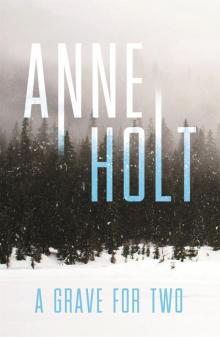 A Grave for Two
A Grave for Two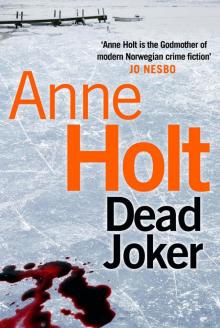 Dead Joker
Dead Joker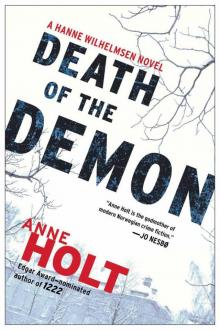 Death of the Demon: A Hanne Wilhelmsen Novel
Death of the Demon: A Hanne Wilhelmsen Novel Punishment aka What Is Mine
Punishment aka What Is Mine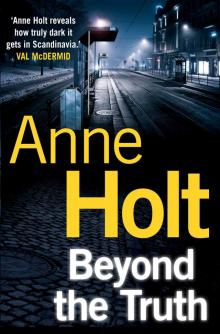 Beyond the Truth
Beyond the Truth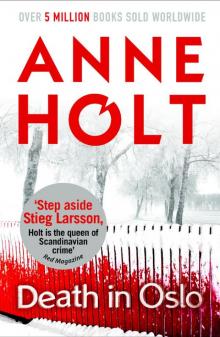 Death in Oslo
Death in Oslo The Blind Goddess
The Blind Goddess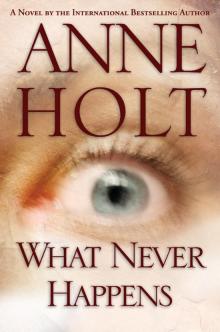 What Never Happens
What Never Happens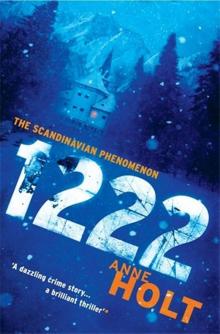 1222
1222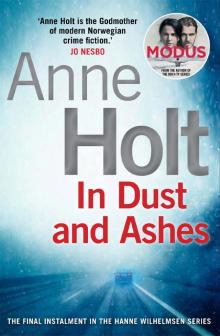 In Dust and Ashes
In Dust and Ashes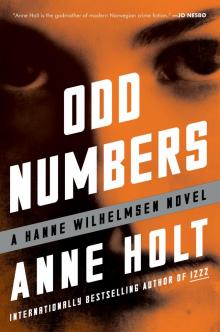 Odd Numbers
Odd Numbers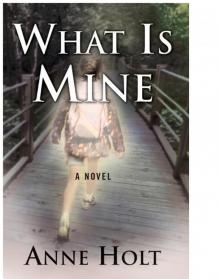 What is Mine
What is Mine What Dark Clouds Hide
What Dark Clouds Hide Blessed Are Those Who Thirst
Blessed Are Those Who Thirst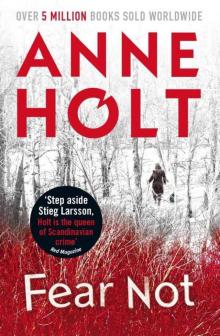 Fear Not
Fear Not No Echo
No Echo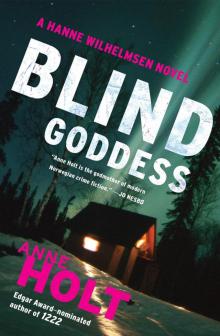 Hanne Wilhelmsen - 01 - The Blind Goddess
Hanne Wilhelmsen - 01 - The Blind Goddess